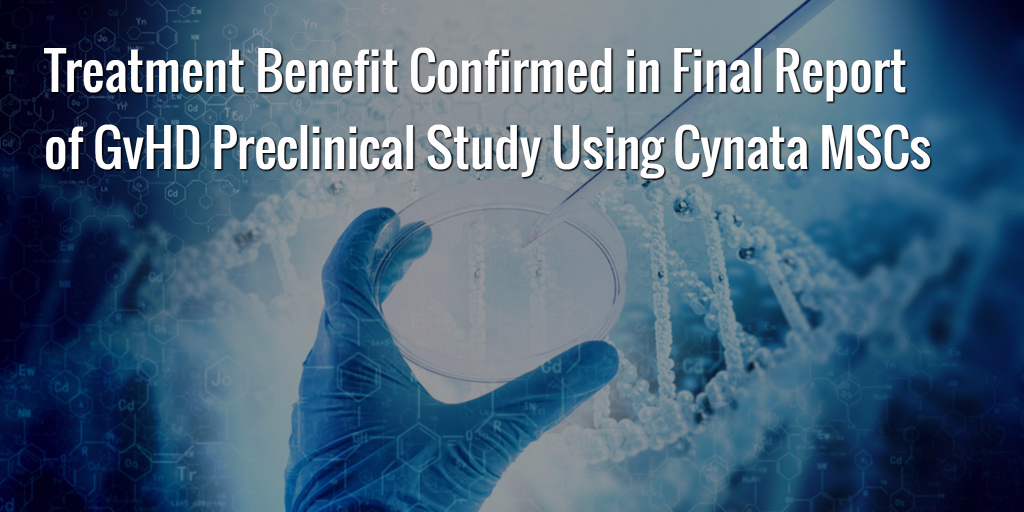-
Robust survival benefit resulting from treatment with CYP-001 confirmed
-
Substantial body of data generated to support mechanism of action of CYP-001 in GvHD
 Melbourne, Australia; 6 February 2017 — Australian stem cell and regenerative medicine company, Cynata Therapeutics Limited (ASX: CYP), announced today that it has received a final report of the proof of concept study of its lead CymerusTM mesenchymal stem cell (MSC) product for graft-versus-host disease (GvHD), CYP-001, in a humanised mouse model of GvHD, which was conducted under the supervision of Associate Professor Lisa Minter at the University of Massachusetts Amherst (UMass), USA. The report confirms and extends the findings from the initial study with the data showing a clear and robust therapeutic effect of CYP-001.
Melbourne, Australia; 6 February 2017 — Australian stem cell and regenerative medicine company, Cynata Therapeutics Limited (ASX: CYP), announced today that it has received a final report of the proof of concept study of its lead CymerusTM mesenchymal stem cell (MSC) product for graft-versus-host disease (GvHD), CYP-001, in a humanised mouse model of GvHD, which was conducted under the supervision of Associate Professor Lisa Minter at the University of Massachusetts Amherst (UMass), USA. The report confirms and extends the findings from the initial study with the data showing a clear and robust therapeutic effect of CYP-001.
In this study, severe acute GvHD was induced by infusing human peripheral blood mononuclear cells (PBMCs) into gamma-irradiated mice. The study involved two stages. The first stage involved a survival study, in which animals were randomly assigned to control or treatment groups. Treated animals received either one or two doses of CYP-001, while control animals received only saline. As announced in April 2016, the interim results showed that CYP-001 treatment substantially prolonged survival in this model.
The second stage of the study involved additional survival studies with larger numbers of animals, to confirm that the results of the initial survival study were robust, in addition to a series of analyses at two pre-defined timepoints in further cohorts of animals, with the aim of investigating the mechanism of action of CYP-001 in treating this disease.
The survival study involved a total of 60 animals, which were randomly assigned to one of six groups:
- Gamma irradiation controls (n=8): no GvHD; no CYP-001 treatment
- CYP-001 single dose controls (n=8): no GvHD; administration of a single dose of CYP-001
- CYP-001 dual dose controls (n=8): no GvHD; administration of two doses of CYP-001
- GvHD controls (n=12): GvHD; placebo control treatment
- CYP-001 single dose treatment (n=12): GvHD; treatment with a single dose of CYP-001
- CYP-001 dual dose treatment (n=12): GvHD; treatment with two doses of CYP-001
As expected, in the groups in which GvHD was not induced (gamma irradiation controls, CYP-001 single dose controls and CYP-001 dual dose controls), all animals remained healthy for the full 100-day study period, indicating that CYP-001 treatment did not adversely affect these animals. In animals in which GvHD was induced, the control animals survived for a median of just 24.5 days. However, treatment with CYP-001 markedly prolonged survival with the median survival time being 48 days and 57 days, respectively, in recipients of a single dose or dual doses of CYP-001. The differences between each CYP-001 group and the control group were highly statistically significant, showing that treatment with CYP-001 doubled, at least, the survival time of the treated animals.
The mechanistic studies in the second stage of the study generated a substantial body of data, including evidence that CYP-001 treatment significantly decreased the percentage of CD4 and CD8 T cells infiltrating the bone marrow. This finding is noteworthy as infiltration of the bone marrow by CD4/CD8 cells is considered to be a key driver of GvHD, in this pre-clinical model. Full details of these findings will be described in a manuscript submitted to a leading peer-reviewed journal.
Associate Professor Minter commented “we conclude that either a single- or dual-dose treatment with Cymerus™ MSCs significantly attenuates disease severity and provides a robust survival benefit in our preclinical model of GvHD. Furthermore, our analysis of biomarkers provides important insights into the mechanism of action of Cymerus™ MSCs, and a framework for monitoring in clinical trials. We are delighted to have been able to make a contribution to the progression of this exciting therapy towards clinical trials.”
Cynata Vice President of Product Development, Dr Kilian Kelly, said “the results generated in the first stage of this study were sufficiently compelling to support approval of our clinical trial in GvHD, but nevertheless we felt it was important to add rigour to the survival data and develop further insight into the mechanism of action of CYP-001 in this devastating condition. The additional results produced by Associate Professor Minter and her team reinforce the interim findings and provide a strong therapeutic rationale for our clinical program”.
Contacts
Dr Ross Macdonald, CEO: Tel: 0412 119343; email [email protected]
Dr Stewart Washer, Executive Chairman: Tel: 0418 288212; email [email protected]
Rudi Michelson, Monsoon, Australia Media Contact, 0411 402 737, [email protected]
About Cynata Therapeutics (ASX: CYP)
Cynata Therapeutics Limited (ASX: CYP) is an Australian stem cell and regenerative medicine company that is developing a therapeutic stem cell platform technology, Cymerus™, originating from the University of Wisconsin-Madison, a world leader in stem cell research. The proprietary Cymerus™ technology addresses a critical shortcoming in existing methods of production of mesenchymal stem cells (MSCs) for therapeutic use, which is the ability to achieve economic manufacture at commercial scale. Cymerus™ utilises induced pluripotent stem cells (iPSCs) to produce a particular type of MSC precursor, called a mesenchymoangioblast (MCA). The Cymerus™ platform provides a source of MSCs that is independent of donor limitations and provides an “off-the-shelf” stem cell platform for therapeutic product use, with a pharmaceutical product business model and economies of scale. This has the potential to create a new standard in the emergent arena of stem cell therapeutics and provides both a unique differentiator and an important competitive position.





















Tell Us What You Think!